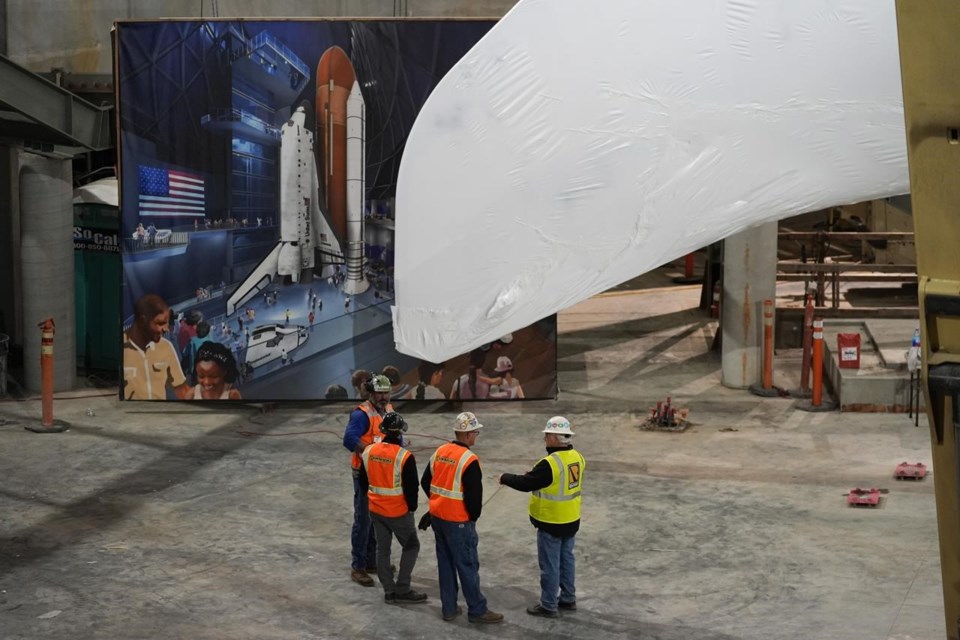LOS ANGELES (AP) — NASA's retired space shuttle Endeavour was carefully hoisted late Monday and attached to a huge external fuel tank and its two solid rocket boosters at a Los Angeles museum where it will be uniquely displayed as if it is about to blast off.
A massive crane delicately moved the orbiter, which is 122 feet (37 meters) long and has a 78-foot (24-meter) wingspan, into the partially built Samuel Oschin Air and Space Center at the California Science Center in Exposition Park.
Crews then attached Endeavour, covered in a protective wrapping, to the tank in a process that lasted into the predawn hours Tuesday. The building will be completed around Endeavour before the display opens to the public.
“This is a huge morning for us now," said Jeffrey N. Rudolph, president and CEO of the science center, who estimated it will take up to two years to finish the project.
“The scale of it is something that really amazes people,” he said. “Everyone who sees it, even those who’ve seen the shuttle before, they say wow.”
The 20-story-tall display stands atop an 1,800-ton (1,633-metric ton) concrete slab supported by six so-called base isolators to protect Endeavour from earthquakes.
All parts of the vertical launch configuration are authentic components of the shuttle system, including the rust-colored external tank, which was flight-qualified.
“It's incredible,” said Larry Clark, a veteran NASA contractor who spent nearly his whole career as a shuttle engineer and is a consultant to the science center's project.
“It brings back a lot of memories for me,” he said. “You know, I saw every space shuttle on the launch pad that ever flew as I worked on the launch pad, and to stand here and see it again like this is kind of melancholy.”
Clark described the work completed early Tuesday as a “soft mate.” The attachments will be further tightened Wednesday.
Endeavour flew 25 missions between 1992 and 2011, when NASA’s shuttle program ended.
The shuttle was flown to Los Angeles International Airport in 2012 atop a NASA Boeing 747 and then created a spectacle as it was inched through tight city streets to Exposition Park. The external tank arrived by barge and made a similar trip across the city.
The shuttle was initially displayed horizontally in a temporary exhibit hall. A groundbreaking ceremony for the Air and Space Center was held in 2022 on the 11th anniversary of Endeavour’s final return from space.
The process of assembling the shuttle system in vertical configuration was dubbed “Go for Stack,” an informal term for putting together rocket components for launch.
It began in July with precise installation of the bottom segments of the side boosters, known as aft skirts, for the first time outside of a NASA facility. In use, the boosters would be attached to the external tank to help the shuttle's main engines lift off.
The 116-foot-long (35.3-meter-long) rocket motors were trucked to Los Angeles from the Mojave Desert in October and installed the following month.
In addition to completing the building, about 100 other aircraft and spacecraft will be installed along with numerous interpretive exhibits, Rudolph said. About $360 million of the $400 million cost has been raised.
In all, NASA operated five shuttles in space. Shuttle Challenger was lost and its crew of seven died in a launch accident Jan. 28, 1986. Columbia broke apart during reentry on Feb. 1, 2003, killing all seven on board. Retired shuttles Atlantis and Discovery and the test ship Enterprise, which did not go to space, are on display across the country.
Atlantis is at Kennedy Space Center, Florida, where it is displayed as if in orbit with its payload doors open and robotic arm extended. Discovery rests on its landing gear at the National Air and Space Museum's Steven F. Udvar-Hazy Center in Chantilly, Virginia.
Enterprise, which was released from a carrier aircraft for approach and landing tests, is displayed at the Intrepid Museum in New York.
John Antczak, The Associated Press



